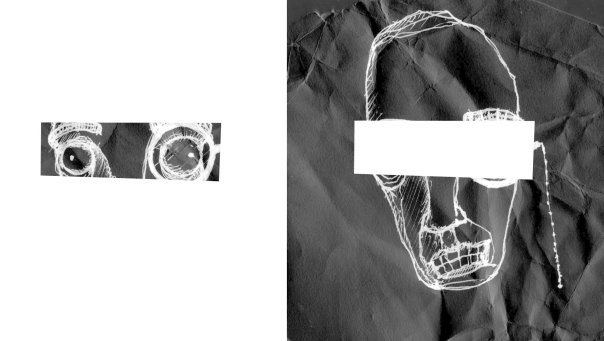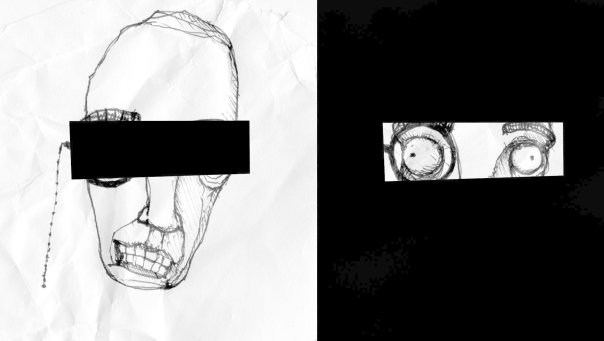| From White Darker Than White |
This song was waiting for me for a long time. If memory serves, the first time I had heard it was during my winter vacation back in Canada. As is typical of my lifestyle back home, it was 4 in the morning and I was crouched on a chair at my desk, possibly eating chocolate. I played the song, noted it, and then quickly forgot it. Then today, in a cafe nestled safely within my remote village, an ocean away from that life, I sat at a table surrounded by other staff of my school, absorbed by my own musings while staring at the mountains. Rediscovering the song two days before, I had played the song repeatedly, not really knowing or even thinking of why; just revelling in the aesthetic pleasures of it.
Then, sitting in that cafe, the ghost of a cheesecake haunting the plate in front of me, people talking in muted tones around me, myself tracing the bare pines of the distant range, bare trunks coiling to spring into verdant blush, an image of startling clarity and simplicity flashed in my mind to the sound of this music. A tree. I couldn't say what type; more than the data required to make that judgment, this tree was an idea. And when such a poignant idea manifests, it transforms everything around it. If this song that I was hearing was the air around the tree, it was not like the air that usually surrounds us, or the air that surrounded my physical self at that moment. In that particular time and space, the physical air was like a solvent into which myself and the people around me were dissolved. The same air surrounded us and permeated our tissues, and yet could not draw us into the same reality, our forms being delineated by a common void, joined only by what separated us. No, that music was the air summoned by the tree to be its voice. The music was the tree and vice versa. Seeing that tree, and breathing that music, I was no longer in Japan.
 I wasn't in a cafe in Shirawaka Village, but I also wasn't bounding over Mt. Haku to the sea and back home. One isn't spoken to by a tree and possessed by an urge to fly. If you are called by a tree to listen and to see, and you allow yourself to do so, you bear witness to another type of movement altogether. Not a linear movement from A to B, but a movement in stillness; a movement betrayed only by breathes building into hours into years into ages. This is why looking at the rings of a severed tree trunk, I feel both a sense of exaltation and sadness. Wrapped inseparably tight within those rings are the traces of countless lives, animal, plant, and human. To be able to see a tree that way, and to see life that way for that matter, is to stand outside of it. "Step back and see the big picture," we say. But to do that we have to step out of line, out of our place, out of the process, perhaps out of life. To see that tree, I had to leave behind those kind teachers sitting with me in that cafe.
I wasn't in a cafe in Shirawaka Village, but I also wasn't bounding over Mt. Haku to the sea and back home. One isn't spoken to by a tree and possessed by an urge to fly. If you are called by a tree to listen and to see, and you allow yourself to do so, you bear witness to another type of movement altogether. Not a linear movement from A to B, but a movement in stillness; a movement betrayed only by breathes building into hours into years into ages. This is why looking at the rings of a severed tree trunk, I feel both a sense of exaltation and sadness. Wrapped inseparably tight within those rings are the traces of countless lives, animal, plant, and human. To be able to see a tree that way, and to see life that way for that matter, is to stand outside of it. "Step back and see the big picture," we say. But to do that we have to step out of line, out of our place, out of the process, perhaps out of life. To see that tree, I had to leave behind those kind teachers sitting with me in that cafe.The best love songs, like this one, embody that same dilemma. What do we want to hear in a love song? Better yet, if we could all sing one of our own, what would we say? When a poem is written or a song is sung, the colors and tones of our love are revealed. But to do that we have to step away from it. True loving is like living is like breathing: it is happening right now and if you pause even just to contemplate it you'll have necessarily separated yourself from it. If you try to take a snapshot of your child running, you have to sacrifice the immediacy of your own sight for the filter of the camera's, only to produce a facsimile of that feeling of simple joy. I find that becoming conscious of my own blinking is a sure sign that I have stopped living, at least in that dynamic sense. So to sing a love song means to be watching love from afar. And to be moved by a love song means to be swallowed by its absence. The most poignant love songs, the ones that push the tears to just behind your eyes, are the ones intoning of love lost. In a song, love is inseparable from heartbreak. Of course not explicitly, but tacitly, in the sense that if we were really loving at that moment then we wouldn't have the presence of mind to reflect upon it. Reflection implies a subjective separation. If loving is living, then sometimes thinking is dying.
So when I saw that tree and heard that song, I felt years passing. Anthony Hamilton's "The Point Of It All," has a strange nostalgic quality. It's like the projection of an old film reel. You can see the fluttering shutter of the light picking up particles from the air. The figures projected are not quite fluid, you can see the small increments where the process has bled life from a particular moment in time to make this reproduction. When a record is sped up, the first feeling you are aware of is the chaos and the chatter of the tempo being torn from its original state; however, there is rare moment when, amidst the speeding, the base rhythms and melodies meld to make a new composition. This song sounds like the record of so many lifetimes, the course of so many passions, the shine of so many hopes, all paradoxically sped up to create a slow deliberate pulsing. The dusty sonorance of the song's organ, as well as the soft trailing of the percussion, seem to embody this quality. And blended into this harmony are Hamilton's rich vocals, soaked in your parents' wisdom, the vigor of youth, and the love of generations. This is the soundtrack for the lifespan of our deepest, most intimate, and most simple truths.
Hearing the song in this way, I began to imagine the tree growing. To the muted undulations of the music, I watched the spare and insistent sprouts of a sapling grow into a capacious canopy, each increment of growth like the single frame of an old film. I began to think of all the trees in my life; I realized that at home, in Canada, a good house always has a tree, like its soul. I thought of the great willow tree I could see out of my sister's window in Marlborough Park. I thought of the young tree my grandparents planted in the backyard of their old house. I thought of all the trees whose lives I could not share because my own was too short. I thought of how the march of time had pushed me past those trees, leaving them only in my memories. Then I thought of how I yearned for the home of my heart, for my source. Of how this feeling was the spirit permeating the tree and song of my vision. I thought of the symmetry of roots and foliage. I imagined myself a single fibre woven into a resilient yet pliable brown pillar. I thought of my cousin's child Kingston, just born and the first of my generation of my family. I thought of my Grandparents, upon whom I heap all of my praises, of my Mother, my Father, my Sister, my Aunts, Uncles, Cousins, my Friends. Speaking of this vision, I have only this to say: The point of it all is I Love You.
J. J. Baylon


